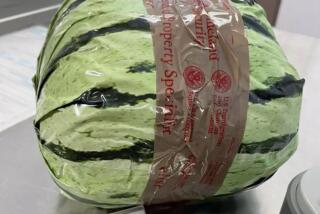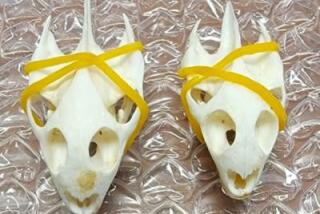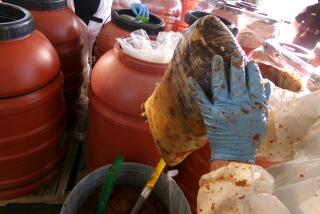Smuggled live beetles found stashed inside Japanese snacks at LAX, officials say

- Share via
The packages of potato chips, chocolate and various Japanese snacks that arrived at Los Angeles International Airport last month contained more than just tasty treats.
Hidden inside the bundle were insects not fit for consumption, but ideal for exotic beetle enthusiasts.
U.S. Customs and Border Protection agriculture specialists found 37 giant live beetles — valued at $1,480 — stashed inside an air cargo shipment that had arrived in California from Japan, authorities said this week.
A woman flying from Los Angeles to Pennsylvania wound up on the TSA’s naughty list after an officer discovered a trove of almost 90 forbidden items inside her carry-on.
Exotic insects have become popular among collectors and invertebrate aficionados across the globe. Insects are frequently sold online and through underground sources, making them a lucrative part of the illegal wildlife trade.

But they can wreak havoc on forests and agriculture, according to the U.S. Customs and Border Protection.
“They may look harmless but in reality, smuggled beetles pose a significant threat to our vital agriculture resources,” Cheryl M. Davies, the director of field operations in Los Angeles for U.S. Customs and Border Protection, said in a news release. “Beetles can become a serious pest by eating plants, leaves and roots, and by laying eggs on tree bark, which damages our forests.”
The Southern California Wildlife Confiscations Network aims to simplify the placement of confiscated, trafficked animals, allowing federal authorities to focus on investigations.
The U.S. Department of Agriculture requires those who want to import live insects into the United States to obtain a permit. But some try to flout those rules, officials said.

The U.S. Department of Agriculture seized the beetles and will determine where the insects will go next. Officials say they likely will be donated to local zoos that have permits for such insects or will be preserved for a local collection.
Who shipped the beetles, or their intended final destination, was not immediately clear.
More to Read
Sign up for Essential California
The most important California stories and recommendations in your inbox every morning.
You may occasionally receive promotional content from the Los Angeles Times.













